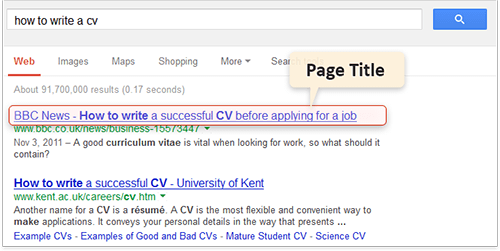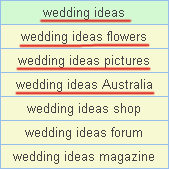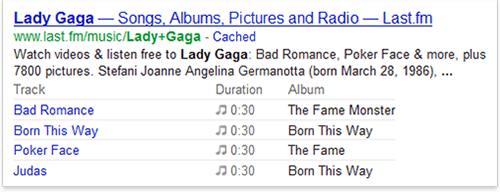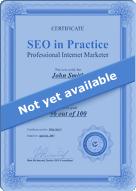3.6 Tune up the landing page
First, let′ s see what we have:
- a landing page waiting to be optimized
- a list of keywords for your landing page
- software that lets you make an ideal landing page
Quite enough to make your site a success. And, one by one, you′ ll make things to add flavor to your page.
Give your page a good title
Page titles are displayed by Search Engines in their results pages. So this title is quite often the most prominent thing for your users, and for Search Engines. And sure, as it′ s the first thing they learn about your page, its importance is huge. That′ s why we start from the title.

Page′ s title in Google results
Oh, my wife would tell you the same thing, for sure! The first thing to learn matters a lot.
Think of this: when we met at that unicorn party, what could my friend tell about her?
Here are just two of the options: "Hi Dan, this is Linda, my sister′ s roommate. She′ s so fun to get drunk with!"
or
"Hi Dan, this is Linda, my sister′ s roommate. She loves Depeche Mode like you do."
I guess it′ s obvious, what′ d make me think better of her.
Sure, the number of options is unlimited. And, telling you the truth, what my friend in fact said about my future wife was: "Dan, meet Linda, Kelly′ s roommate". Then he whispered "Don′ t miss this butt!".
I wish all page titles could work as great on crawlers and users, as this phrase worked on me ;)
Now, make a TITLE for your landing page.
Note: page title should be unique for your website. It′ s better if you don′ t have two pages that bear the same title.

Look at your list of keywords.
For the title, take your first major (green) keyword, then a couple supplementary (yellow) ones, depending on how long they are. Plus, you need something descriptive, telling about the purchase, or discount, or delivery, or anything else concerning your service that will let the title stand out.
And remember:
You can separate keywords by comma (,), hyphen (–), or pipe sign (|). Most webmasters use pipe. Fine, but it doesn′ t look natural. The title just doesn′ t read like a real phrase.
Use commas or hyphens — this makes no difference to Search Engines, but looks more human to users.
Another thing to remember: The length of your title should not exceed 65 characters (including spaces), as otherwise it will be truncated by a Search Engine.
For instance, a great title for your weddings–related website would be:
Wedding ideas, dresses, accessories — free delivery in Sydney
As a title tag, and it looks like this:
<title>Wedding ideas, dresses, accessories — free delivery in Sydney</title>
Here′ s a real title from the website http://www.weddingchannel.com:
And just some more examples of nice titles:

Now WebSite Auditor helps you make a perfect title. Look at the part of Page Structure Audit Report describing the Page Title (title length, duplicate titles, etc.). Check the recommended number of words and keyword density there, and make a nice title that fits. Make use of your keywords, like I said before. And, remember it should look attractive to a human.
Don′ t wait to upload the pages with new titles to the server. Just do it and see what effect it can take!
DO IT NOW! Change the title of your web page and make sure it appears on the Internet.
Add Meta description tags
What′ s in fact a Meta description tag? This tag is used to give a user a brief overview of your page. Although it has no influence on rankings, you′ d better not ignore it, as in most cases Meta description forms a snippet.
What′ s a snippet? Well, snippets appear below the links on Search Engines′ results pages and are designed to give users a sense for what′ s on the page and why it′ s relevant to their query. Surely, it can either attract users or scare them off.

A page′ s Meta description displayed in Google
Here′ s how Meta description tag looks like:
<meta name="description" content="Brief description of the contents of your page.">
There are several things you should remember about meta descriptions:
- they should be unique and relevant for every page, so avoid duplicate descriptions
- their length should not exceed 155 characters (including spaces) if you want your snippets appear in SERP nice
- they should make a user eager to click the result and learn more, that′ s why you′ d better include information about sales, free delivery, reviews, etc.
So here′ s what you need to do: stuff your Meta description with keywords, though reasonably, and make it look like an irresistible invitation to your web page.
Want some examples? Here′ s where guys have done a good job:


Here′ s an example of how a description can be written:
<meta name="description" content="Get fantastic wedding ideas, best wedding gifts, nice cards, all kinds of wedding flowers and any wedding accessories for weddings all over Australia.">
Now look what the report says about keywords density and description length. For your site, make it as close to what′ s recommended in WebSite Auditor, as possible. And, like you did with the page title, make description tags available online.

Meta description data from WebSite Auditor
Implement rich snippets
Do you know how to make your listing on the results page even more appealing and informative? Have you heard about rich snippets? Well, it′ s high time to learn what it is and how they can help your website promotion.
Rich snippets appear if you implement a special markup, which signals to Search Engines that a certain page is about a particular item (i.e. person, place, product, video, recipe, etc.), like in the examples below:
- Review

- Music

- Recipes

- Video

No doubt, such search results look more catchy and informative and therefore can drive more visitors to your site. Implementation of such markups like schema.org will require some time and your webmaster′ s help, but believe me, it′ s worth that effort!
You′ ll find more information about the implementation of such markups at http://schema.org/ and http://support.google.com/webmasters/bin/answer.py?hl=en&answer=1211158.
Also, before publishing your web pages with schema, I suggest entering the code into the Rich Snippets Testing Tool (http://www.google.com/webmasters/tools/richsnippets). It shows the information that a Search Engine can pull from the schema code and offers a quick diagnosis of any errors.
That′ s it with the Meta tags I guess...
But you may ask: What about Meta keywords?
Well, in the early days of search the "keywords" attribute was popularized by Search Engines and was one of the ranking factors. However, it was often misleading and by the early 2000′ s most Search Engines stopped relying onto it. In 2009 Matt Cutts from Google said that these tags are no longer taken into account. That′ s why filling these tags will have no value for your SEO efforts.
Moreover, if you fill these tags with the keywords you promote, there′ s a chance that your competitors will peep into these data (just like you probably did when searching for ideas during keyword research, remember?). That′ s why, even if you haven′ t filled in these tags, you may sleep peacefully
DO IT NOW! Add TITLE and Meta description tags and upload the changed pages to your web server.



Answer
Answer
Answer
Answer
Answer
Answer
Answer
Answer
Answer
Answer
Answer
Answer
Answer
Answer
Answer